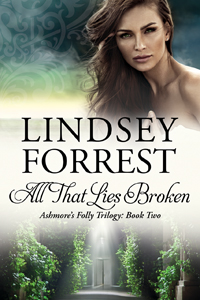Interview
I always like to find out how authors develop their characters and plot, not only as a writer but as a voracious reader. I figure that at least some of my readers might like to know a little more about the development and writing of Ashmore’s Folly.
One of my co-editors at work “interviewed” me via instant messaging. Amidst a great deal of giggling (alas, no wine, as we were “working”), she posed these questions:
Where do you get your ideas?
The infamous question that all authors dread! I have always liked the answer of Barbara Michaels/Elizabeth Peters: There’s a drugstore in North Dakota where I order mine. My answer is a little different.
I win them on Ebay.
So don’t even think of bidding against me. I didn’t get that 3300+ feedback rating for my charm. I got it by being one of the sneakiest bidders you will ever come across.
What is your greatest challenge in writing?
Finding the time and energy to write. I have a family and a demanding day job that pays the bills. I heard once about a local author who was teaching school and raising two daughters as a single mom, and I don’t know how she did it.
Your characters use a lot of technology, yet the story is set in 2002. Did this present any challenges?
One of the hardest things to remember in writing about technology is remembering how far and how fast we have come in the last few years! I had to scramble to remember what tech wasn’t yet available or hadn’t advanced in 2002. I think it must be easier to write about a more distant time when the technology we take for granted today didn’t exist at all, instead of just being in its infancy.
Take cell phones, for example. In 2002, the Blackberry was the zenith of cell phone technology, and both Richard and Cam have Blackberries that they never seem to be without. While we send pictures through email without a thought or post them via smartphone to the web, the only way that Richard Ashmore is able to send himself a photograph is through the use of his Blackberry. In 2002, you could get an attachment for the Blackberry to take and email pictures, but smartphones with cameras did not yet exist. Since he took a color photo, it probably took most of the evening that he and Laura spend together in Chapter 5 of All Who Are Lost for that photo to hit his email inbox.
Small MP3 players were just making their debut, including the iPod, and sure enough, Meg St. Bride has one which comes into play. Laptops still had 3.5″ disk drives, and to read a smart card, you had to have an attachment (also important). Card slots weren’t yet being built into laptops. iTunes was just getting started, so “downloading music” meant Napster with all its attendant legal problems. In All That Lies Broken, Richard and Laura get to act parental as each chastises a child for illegal downloading.
The most amusing tech moment for me occurs in the second book, when Laura looks at a 512MB memory card and says that she doesn’t think her camera has such a large capacity card. Today, of course, a 512MB card isn’t even sold because it isn’t worth it. I haven’t seen a card with less than 8 GB of memory in a long time.
At one point, Laura takes control of her life and finances, attempting to distance herself from the St. Bride family. Feeling proud of herself for her independence, she starts paying her bills online. While most of us would look askance at someone now who doesn’t pay bills online, the fact is that, in 2002, that was not so common. I started paying bills online in 1999, and I was the first one in my family to do so.
Richard Ashmore is involved with three of Dominic Abbott’s four daughters, but he has a different connection with the fourth Abbott sister, Lucy. Diana is his youth, Laura his future, and Francie his great folly. What does Lucy represent?
The Ashmores took Lucy in after her mother abandoned her, so she and Richard were raised together as siblings. They are less than two years apart in age and are virtual contemporaries. Since you never meet Richard’s parents except in flashback or through the memories of other characters, Lucy represents Richard’s family and provides a window into his real self. Through much of the first book, he is reserved and defensive — he knows he screwed up royally with the three daughters raised by Dominic Abbott, and he is determined to avoid another monumental mistake. But he was (and is) a caring son, brother, and father. Through his interaction with Lucy, you get to see Richard as he really is, without the distortion of Diana’s snark and deception and Laura’s guilt and leftover infatuation.
As both sister and sister-in-law to Richard, Lucy finds her loyalty torn as his marriage disintegrates. As seen in Diana’s memories, Lucy tends to side more with her brother as time goes on. She is far more an Ashmore than an Abbott.
Favorite character? Least favorite character?
Naming a favorite or least favorite character is like naming your favorite or least favorite child. (Although that’s easy in my case, since I only have one kid. Depending on the moment, she’s one or the other.)
That being said, I do have a favorite character to write — as in, I enjoy being in this character’s head, writing through this character’s eyes. So — drum roll!!!
Diana Ashmore.
Diana, you say? The lying, snarky Diana whose purpose in life seems to be to make my hero’s life miserable?
Yep, that Diana.
Sure, she’s a liar. Sure, she’s snarky. She’s fun to write because she has a very strong voice and she has no filter. She says whatever she thinks, she doesn’t take into account anyone else’s feelings (especially Richard’s), and she is passionate, opinionated, and selfish. While sacrifice drives the lives of both Laura and Richard, the idea never crosses Diana’s mind.
Least favorite to write? See the next question.
Richard’s daughter is not as sweet and innocent as she first appears. Richard seems to have a bit of a blind spot when it comes to Julie’s grittier, sneakier side. Does his inability to recognize certain aspects of her manipulative characteristics echo his blinders when it came to seeing Diana’s true self?
At this point, I can only say that, in the second book, Lucy has cause to think that, when it comes to women, Richard can be dumb as rocks. But it is worth pointing out that Lucy is no slouch at seeing through people, and Julie fools her as well.
The Abbott sisters are true actresses. Unlike Lucy, who is straightforward and honest to the point of being blunt, Julie is more Abbott than Ashmore.
Richard has dark hair, slate blue eyes, Black Irish looks. Did you have someone in mind to play him in the movie?
Uh…yes, but that actor is now too old. The next one up is too young. Sigh. I will not be naming names.
You hate smoking. Why does Richard start off a smoker?
Through Diana’s monologues to herself, we do learn why he started to smoke, and he admits he has tried to quit several times over the years. As a nonsmoker, I can only guess how difficult quitting must be, so I tried to show the temptation he faces as he attempts to give it up once again.
He also drinks a lot of coffee. As a tea-drinker, I had to be educated that a true coffee lover would never drink instant as often as he did in earlier drafts. So I added a little aside in the second book where he brings over coffee to keep at Laura’s because, he says, all she has is instant.
I also had to be told that coffee now “brews”; it does not “percolate” anymore.
So what’s with the chapter titles?
I added chapter titles because I always like them in books. Some suggested themselves (“The Day,” “After,” “Upon That Shore,” “Here Be Dragons”); others I derived from song lyrics (“Knocking on Forbidden Doors,” “Three Little Maids Are We,” “Blue Eyes, Dark Heart,” “The Journey Home”). Diana’s chapters were by far the most difficult, as originally they were all “Diana.”
Most titles have at least two meanings for their chapters; at least one has three.
My favorite in All Who Are Lost? Hands down: “Sex, Lies, and Thomas Jefferson.”
In All That Lies Broken? “None Shall Sleep” and “From the Sky to the Sea.”
In All That Burns the Dark? “See You in Hell, Darling.” I can’t include another favorite because, even though it is a song title, it gives away a plot point.



